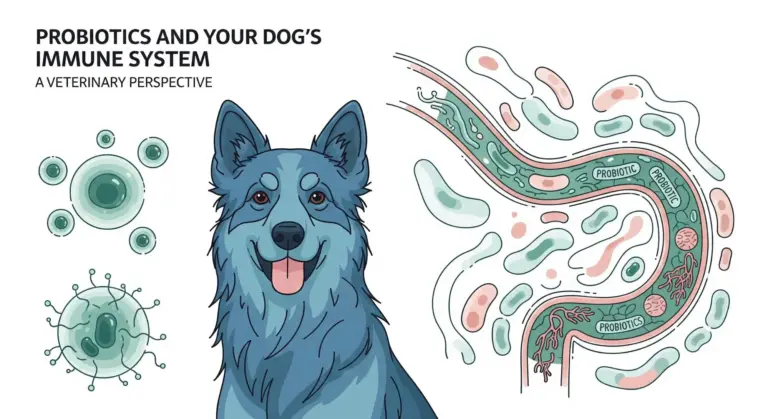
Stress, illness, or a poor diet can impact your dog’s immune system. All of these issues can leave your dog’s built-in health defense system compromised. If your pet regularly suffers from these issues, looking into probiotics may help them protect against health problems. Over the past few decades, probiotics have been used in the veterinary care industry to support the immune systems of animals. Let’s find out more about how these probiotics work, from a veterinary perspective:
Understanding Probiotics and How They Work
Probiotics are helpful micro-organisms, such as good bacteria in the gut and yeast found in food. They provide health benefits when consumed or injected. More specifically, animals, such as various dog breeds, highly benefit from commonly used strains like lactic acid bacteria and bifidobacteria.
However, probiotics are also naturally found in gut microbiomes. You can think of them as tiny little workers that protect your dog’s gut. A healthy dog’s gut contains a balance of these good micro-organisms and some harmful ones. This combination of different bacterial forms is referred to as the gut microbiome.
The Gut-Immune Connection in Dogs and Probiotics For Immunity

Your dog’s gut doesn’t just digest food. It also protects the overall immune system and health of your dog. A balance of good and bad bacteria in the gut acts as a great defense against infections and viruses. Let’s explore how probiotics can aid in this defense:
- Gut and Overall Health Connection: Research has shown that 70-80% percent of your dog’s immune system exists in the gut.
- Digestive Tract: Whatever happens in their digestive tract directly affects their ability to fight against bad bacteria and viruses.
- Good Vs. Bad Bacteria: Good bacteria are generally found in your dog’s gut. It’s the kind of bacteria they need more of. However, bad bacteria are also commonly found in the gut microbiome of dogs. When the good bacteria are present in greater quantities and thriving, they help combat the bad bacteria. This is a natural, built-in defense present in your dog’s immune system.
The Role of Probiotics
Here are a few key points on how probiotics help your dog:
- How Probiotics Help: Antibiotics, illness, stress, and other reasons can be the cause of the disruption. Introducing more good bacteria into your dog’s immune system can help them restore balance if the gut microbiome is disrupted.
- Strong Defenses: A healthy balance in the gut from probiotics can help your pet form a protective health barrier. This protective gut wall can prevent harmful substances from leaking into the bloodstream or triggering an immune response.
- Fighting Inflammation: Sometimes inflammation, indigestion, and bloating can be triggered in dogs that probiotics can help relieve. Probiotics, in this case, are prescribed along with the treatment medication or care plan. Especially dogs at risk of BOAS (Brachycephalic Obstructive Airway Syndrome) can benefit from probiotics and diet management. That’s why VetandTech is holding a free webinar on August 13, 2025, to discuss evaluating BOAS in dogs, so veterinarians can detect signs early on.
Probiotic Support Under Certain Conditions
Dogs can most benefit from probiotics under these conditions:
- Stress
- Illness
- Gut issues
- Food sensitivities
- Appetite issues
- Skin problems and allergies
- Digestive issues
When considering probiotics for your dog’s immune health, it’s important to seek guidance from qualified veterinary professionals. Platforms like Pago, which connect clinics and hospitals offering veterinary jobs with skilled veterinary professionals, help ensure that pet owners have access to knowledgeable practitioners who can recommend the most effective probiotic options tailored to your dog’s specific needs
Tips for Choosing a Veterinary-Recommended Probiotic

Veterinarians look at these factors when choosing a probiotic:
- Safety
- Effectiveness
- Targeted health need
- Adequate amount of live bacteria
A sign of good probiotics for dogs is that they support digestive tract health and help sensitive guts heal. Here are a few probiotics that can help protect your dog’s gut health:
- Promise Pre and Probiotics for Dogs: Promise Pre and Probiotics for Dogs was made for protecting the digestive tract and aiding in food sensitivities.
- TREATIBLES Happy Tummy Probiotic: These heart-shaped chewables have bacon in them and are sweet potato flavored.
- VETS BEST Soft Chews-Probiotic: Made for puppies that are 12 weeks or older, these soft chewables are for supporting digestive health, with six active culture strains of good bacteria.
Frequently Asked Questions
What are probiotics, and why should I give them to my dog?
Probiotics are good bacteria micro-organisms that support your dog’s overall digestive health by balancing their gut microbiome. They can reduce issues like diarrhea, bloating, gas, indigestion, food sensitivity, and allergies.
How do I give probiotics to my dog?
Probiotics can come as capsule pills, treats, and powders. If your dog can easily detect medicine, you can opt for probiotic powder instead. Sprinkle the right dosage over your dog’s food to support their immune system health.
How long does it take for probiotics to work in dogs?
It can take around 4 to 6 weeks of consistent use for pet owners to see noticeable health changes.






